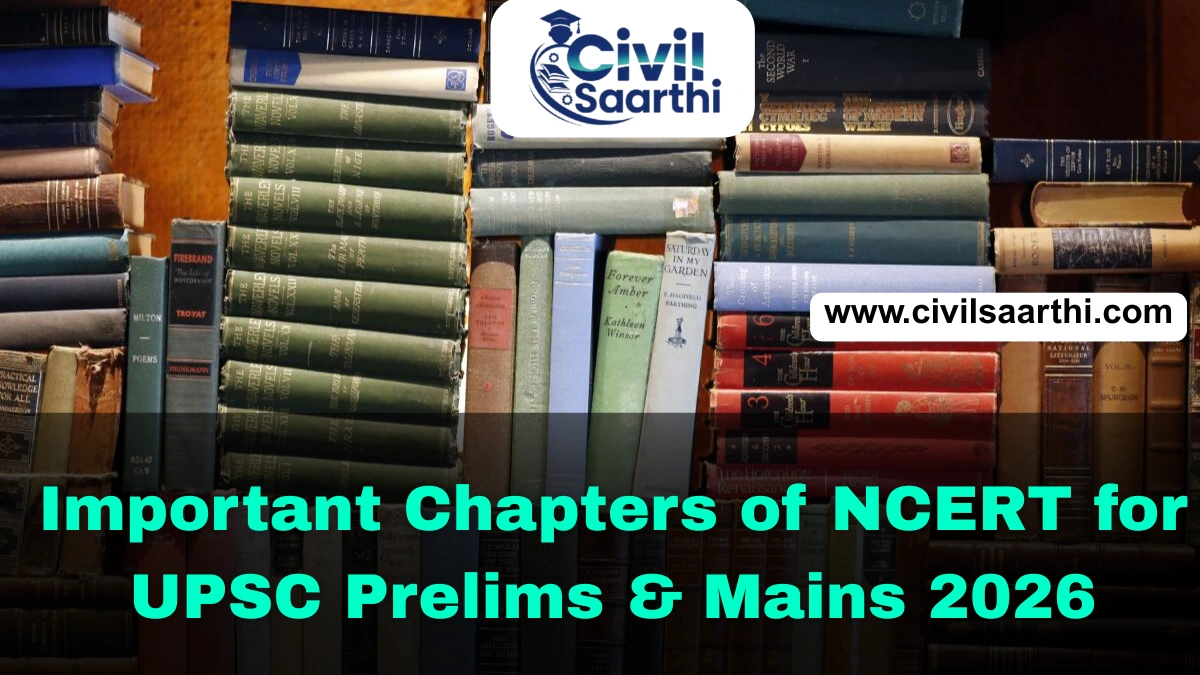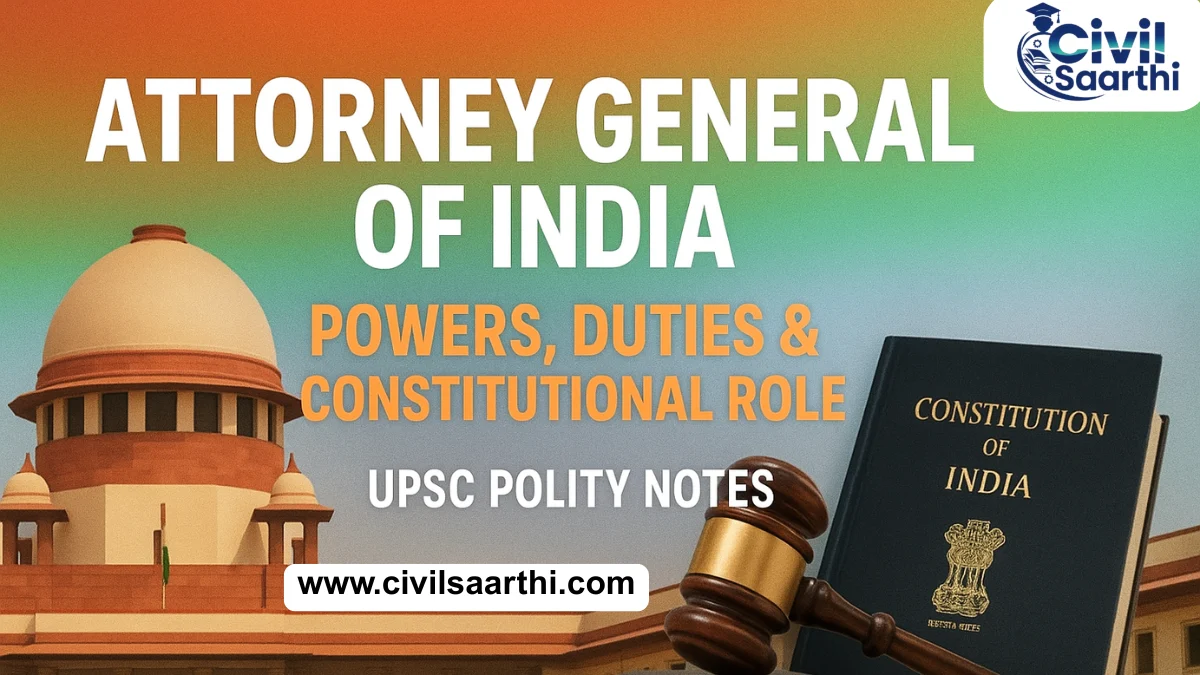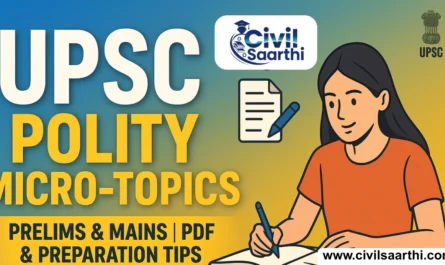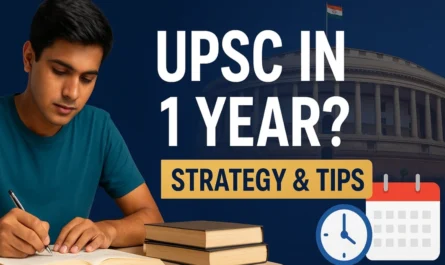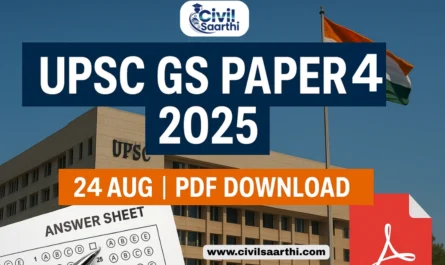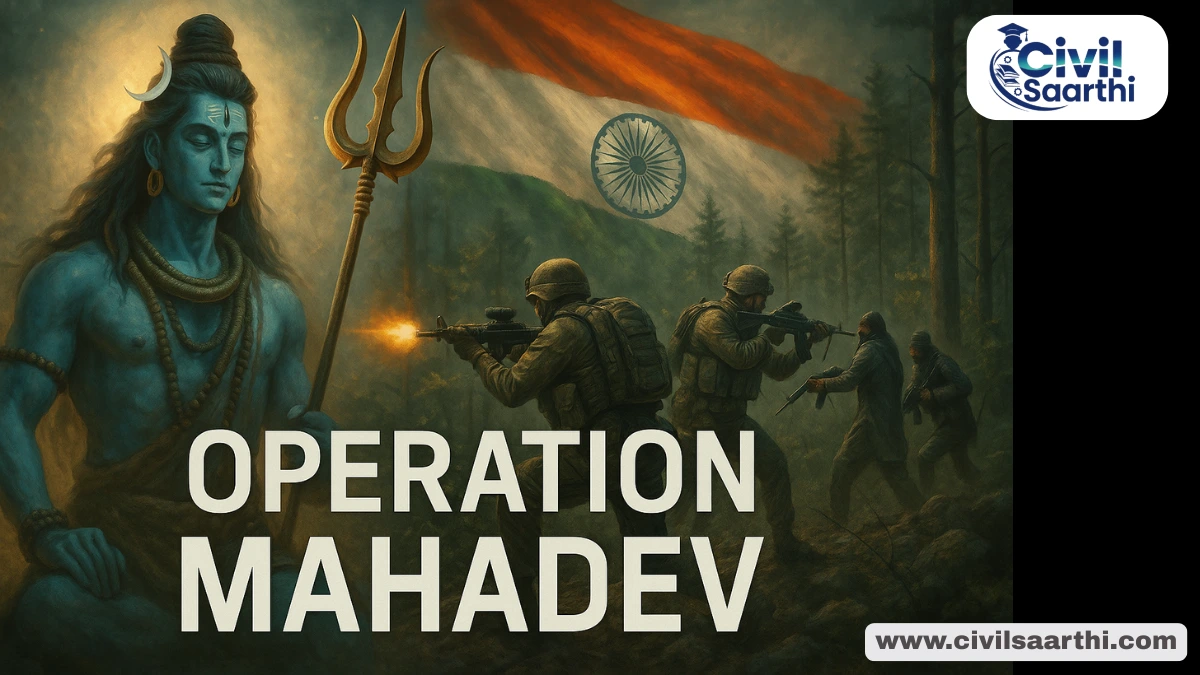Preparing for the UPSC Civil Services Exam requires a strong conceptual base, and NCERT books are the most trusted source for it. They help aspirants understand fundamental concepts in a clear, simple, and systematic manner. Covering NCERTs from Class 6 to 12 ensures comprehensive coverage of subjects like History, Geography, Polity, Economy, and Science.
However, not every chapter is equally useful for UPSC. This article provides a subject-wise list of important NCERT chapters for UPSC, so that aspirants can focus on high-yield topics and save valuable time during preparation.
History NCERT Important Chapters for UPSC
History is one of the most crucial parts of UPSC Prelims and Mains GS Paper 1. NCERT History books help aspirants build a chronological and conceptual understanding of India’s past, from ancient to modern times. Questions in UPSC are often directly or indirectly based on NCERT facts, especially from classes 6-12.’
Download NCERT Class 6th to 12th Books PDF for UPSC 2026
Below is a detailed list of important History NCERT chapters for UPSC:
Ancient India
Class 6 – “Our Past I”
What, Where, How and When
Kings, Farmers and Towns
Early Cities and Vedic Age
Ashoka, the Emperor Who Gave Up War
New Empires and Kingdoms
(Covers early civilizations, early kingdoms, and governance systems relevant for ancient Indian polity and culture.)
Class 11 – “Themes in Indian History I”
Early Societies (Harappan Civilization)
Empire Building – Mauryan and Gupta Period
Cultural Developments and Spread of Buddhism
(These chapters are vital for understanding the socio-economic structure of early India.)
Medieval India
Class 7 – “Our Past II”
New Kings and Kingdoms
The Delhi Sultans
The Mughal Empire
Towns, Traders, and Craftspersons
The Making of Regional Cultures
(Covers political and cultural transitions during medieval India and evolution of administrative systems.)
Modern India
Class 8 – “Our Past III”
From Trade to Territory
When People Rebel (1857)
Civilizing the “Native”, Educating the Nation
The Making of the National Movement (1885–1947)
(Explains how colonial rule evolved and how India’s freedom movement shaped modern India.)
Class 12 – “Themes in Indian History III”
Colonialism and the Indian Economy
Indian National Movement and Mahatma Gandhi
Partition and Independence
(Highly relevant for Prelims and Mains, especially in Modern History and Indian Nationalism questions.)
Science NCERT Important Chapters for UPSC
Science is often overlooked, but UPSC frequently asks basic conceptual and environment-based questions. NCERT Science books simplify complex topics, making them easier to relate to current affairs and general science questions in Prelims.
You don’t need to memorize all details, focus on basic concepts, applications, and environmental relevance.
Class 6–8 Science
Components of Food, Body Movements, and Living Organisms
Materials: Metals and Non-Metals
Light, Sound, and Force & Motion
Natural Resources and Pollution
(These chapters provide clarity on the physical world, motion, and the basics of the human body.)
Class 9–10 Science
Matter in Our Surroundings
Diversity in Living Organisms
Natural Phenomena (Light, Reflection, Refraction)
Sources of Energy and Our Environment
(Important for understanding ecosystem balance, physical phenomena, and pollution.)
Class 11–12 Science (Selective Reading)
Human Physiology (Class 11 Biology)
Environmental Issues and Ecosystem (Class 12 Biology)
Thermodynamics and Electricity (Physics)
Carbon Compounds and Periodic Classification (Chemistry)
(These chapters link directly with UPSC environment and climate-based questions.)
Polity NCERT Important Chapters for UPSC
Indian Polity forms a major part of both Prelims and Mains GS Paper 2. NCERTs explain the basic functioning of democracy, the importance of the Constitution, and the roles of institutions like Parliament, Judiciary, and Executive.
Before moving to standard books like Laxmikanth, it’s essential to understand these foundational chapters.
Class 6 – “Social and Political Life I”
Understanding Diversity
Government and Democracy
(Introduces fundamental ideas about governance and equality.)
Class 7 – “Social and Political Life II”
Role of Government in Health
How the State Government Works
Understanding Media
(Focuses on state-level governance and the role of information in democracy.)
Class 8 – “Social and Political Life III”
The Indian Constitution
Parliament and the Making of Laws
Judiciary
Understanding Marginalization
(These chapters build a strong understanding of the Indian political system and citizens’ rights.)
Class 9–10 – Democratic Politics I & II
Working of Institutions (Parliament, Judiciary, Executive)
Electoral Politics and Political Rights
Federalism and Local Governments
(Highly useful for conceptual questions in UPSC Prelims and analytical questions in Mains.)
Geography NCERT Important Chapters for UPSC
Geography helps candidates understand India’s physical and human landscape. It’s an essential part of both Prelims and Mains GS Paper I. NCERTs simplify complex geographical phenomena like earthquakes, monsoons, and landforms.
For UPSC, focus on maps, resources, climate, vegetation, and population distribution.
Class 6 – “The Earth: Our Habitat”
Latitudes and Longitudes
Motions of the Earth
India: Climate, Vegetation, and Wildlife
(Covers Earth’s structure and India’s geographical diversity.)
Class 7 – “Our Environment”
Inside Our Earth
Air, Water, and Natural Vegetation
Human Environment – Settlement, Transport, Communication
(Important for environmental geography and human settlements.)
Class 8 – “Resources and Development”
Land, Soil, Water, and Minerals
Industries and Agriculture
(Forms the base for India’s resource distribution and economy-based geography.)
Class 9 – “Contemporary India I”
India – Size and Location
Physical Features of India
Drainage, Climate, and Natural Vegetation
(Highly relevant for UPSC Prelims map-based questions.)
Class 11–12 Geography
Geomorphology, Climatology, and Oceanography (Class 11)
Human Geography and India: People and Economy (Class 12)
(Important for understanding population, economic geography, and regional development.)
Economics NCERT Important Chapters for UPSC
Economics is vital for both Prelims and Mains GS Paper 3. NCERTs build your understanding of growth, inflation, budgeting, and economic reforms. The key is to connect basic concepts with current economic developments in India.
Class 9 – “Economics”
The Story of Village Palampur
People as Resource
Poverty as a Challenge
Food Security in India
(Covers basic economic activities and poverty alleviation programmes.)
Class 10 – “Understanding Economic Development”
Development Indicators and Human Development
Globalisation and the Indian Economy
Sectors of the Indian Economy
(Important for understanding GDP, growth, and globalization in simple terms.)
Class 11 – “Indian Economic Development”
Indian Economy (1950–1990)
Liberalisation, Privatisation, and Globalisation (LPG Reforms)
Poverty, Unemployment, and Rural Development
(Gives insight into post-independence economic policies and reforms.)
Class 12 – “Introductory Macroeconomics”
Money and Banking
Government Budget and the Economy
Balance of Payments and National Income
(Directly linked to budget, finance, and fiscal policy-related questions in UPSC.)
Social Science NCERT Important Chapters for UPSC
Social Science integrates History, Geography, Civics, and Economics from classes 6–10. It forms the backbone of many concepts used in Essay, Ethics (GS 4), and Society-related Mains questions.
It helps aspirants understand social justice, equality, and the evolution of human societies, which are key to UPSC’s human-centric approach.
Key Chapters
Diversity and Discrimination (Class 6 Civics)
Gender, Equality, and Rights (Class 7–8 Civics)
Democracy and Its Challenges (Class 9–10 Civics)
Resources and Sustainable Development (Class 8 Geography)
Industrialization and Urbanization (Class 9–10 History)
(These topics provide a sociological perspective and are useful in Essay and Mains GS Paper I.)
Conclusion
NCERTs are the bedrock of UPSC preparation. They provide conceptual clarity, factual accuracy, and help in building a strong foundation before moving to advanced books. Start reading NCERTs from Class 6 onwards, focus on important chapters mentioned above, and make concise notes for revision.
Once you master NCERTs, you can easily grasp advanced sources like Laxmikanth, Spectrum, and GC Leong. Remember — UPSC rewards clarity over complexity, and NCERTs give you exactly that.
Aspirants who have thoroughly read NCERTs from Class 6 to 12 find it easier to tackle even the toughest UPSC questions — making them a non-negotiable part of your journey.
FAQs: Important NCERT Chapters for UPSC
Q1. Which NCERT classes are most important for UPSC preparation?
A1. NCERT books from Class 6 to 12 are essential, but priority is usually given to Class 9–12 for core subjects (History, Geography, Polity, Economics, and Science). Start from Class 6 only if you want strong basics.
Q2. Should I read NCERTs cover-to-cover or selectively?
A2. Focus first on high-yield chapters (e.g., Modern History, Geography fundamentals, Polity basics). Expand to full chapters after the first pass if needed.
Q3. How should I make notes from NCERTs for revision?
A3. Create concise topic-wise notes: 3–6 bullet points per topic, key dates/facts, map pointers, and short one-line summaries. Use flashcards for quick Prelims revision.
Q4. Are NCERTs enough for Prelims and Mains?
A4. NCERTs provide a strong foundation and cover many concepts. Supplement them with standard texts like Laxmikanth for Polity, Spectrum for Modern India, and current affairs for Mains and essays.
Q5. Which NCERT chapters are most useful for Environment & Ecology?
A5. Class 12 Biology chapters on ecology and environment, plus Class 7–10 chapters on natural resources and pollution, are highly useful. Focus on ecosystems, biodiversity, conservation, and major treaties.
Q6. How often should I revise NCERT notes before the exam?
A6. Revise core NCERT notes every 2–3 weeks during preparation. Increase frequency to weekly in the last 2–3 months before Prelims for maximum retention.

